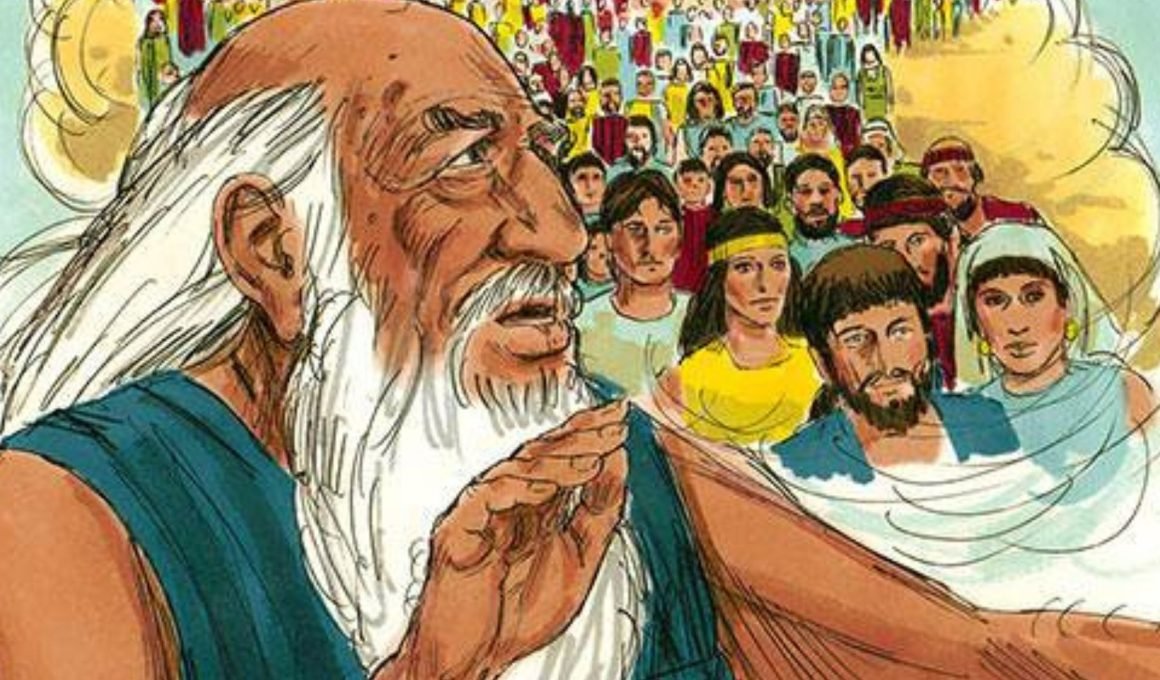The genealogy of Abraham in the Bible is an important topic that helps us understand the roots of many nations and religions.
Abraham, originally named Abram, is considered the father of the Jewish, Christian, and Islamic faiths. His family line, or genealogy, is detailed in various parts of the Bible, especially in the Book of Genesis.
This genealogy not only highlights his ancestors but also his descendants, showing how God’s promises to Abraham were fulfilled through his family. By studying Abraham’s genealogy, we can gain a deeper appreciation for his role in biblical history and the broader story of faith.
Genealogy of Abraham in the Bible
The genealogy of Abraham in the Bible traces his lineage from his father Terah and includes his descendants Isaac, Jacob, and the twelve tribes of Israel.
Here are 15 insight.
1. Terah: The Beginning of a Journey
Abraham’s father, Terah, plays a pivotal role in the narrative of God’s call to Abraham. Terah’s journey from Ur of the Chaldeans towards Canaan (Genesis 11:27-32) initiates a significant shift in the family’s trajectory.
While Terah’s journey was interrupted in Haran, it marked the beginning of God’s plan to establish His covenant through Abraham. This initial movement towards Canaan, though incomplete in Terah’s lifetime, set the stage for Abraham’s eventual obedience to God’s call to leave his homeland completely.
Terah’s obedience to move towards Canaan foreshadowed Abraham’s faithfulness in fully following God’s direction, highlighting the importance of responding to God’s initial promptings and the unfolding of divine purposes over time.
2. Abraham: The Father of Nations
Abraham, originally named Abram, stands as the foundational patriarch in biblical history and the epitome of faith and obedience to God’s call.
His covenant with God (Genesis 12:1-3) marks a transformative moment in Scripture, where God promises Abraham that he will become the father of a great nation. This covenant underscores Abraham’s role not only as the progenitor of a physical lineage but also as a spiritual ancestor to all who would come to trust in God.
Abraham’s journey from Ur to Canaan, and later his willingness to offer Isaac as a sacrifice (Genesis 22), demonstrates his unwavering faith and obedience. Through Abraham, God establishes the principle of faith as the means by which people are justified and blessed, setting a precedent for all believers to follow.
3. Sarah: Matriarch of Israel
Sarah, Abraham’s wife, plays a crucial role in the fulfillment of God’s promise of descendants. Initially barren, Sarah receives a miraculous promise from God that she will conceive and bear a son in her old age (Genesis 18:10-14). The birth of Isaac (Genesis 21:1-3) is a testament to God’s faithfulness in fulfilling His promises, despite human limitations.
Sarah’s journey from skepticism to faith mirrors Abraham’s, and her laughter of joy upon Isaac’s birth symbolizes the fulfillment of God’s plan. As the matriarch of Israel, Sarah’s faith and perseverance serve as an example of trusting in God’s timing and provision, even when circumstances seem impossible.
4. Ishmael: A Parallel Lineage
Ishmael, born to Abraham through Hagar, Sarah’s maidservant (Genesis 16:15), represents a parallel lineage to Isaac. While Ishmael is not the child of promise through whom God’s covenant would be established, God still blesses him, promising to make him a great nation (Genesis 17:20).
Ishmael’s descendants, the Ishmaelites, play significant roles in biblical narratives and history, illustrating God’s mercy and covenantal faithfulness beyond the primary line of Isaac.
The parallel lineage of Ishmael highlights God’s sovereignty in blessing all the descendants of Abraham according to His purposes, even if they do not directly continue the covenant line.
5. Isaac: The Child of Promise
Isaac, born miraculously to Abraham and Sarah in their old age (Genesis 21:1-3), is the child of promise through whom God’s covenant with Abraham would continue.
Named Isaac, meaning “laughter,” his birth brings joy and fulfillment to his parents and serves as a sign of God’s faithfulness in fulfilling His promises. Isaac’s life is marked by his obedience and submission, particularly during the near-sacrifice on Mount Moriah (Genesis 22).
This event symbolizes Isaac’s role as a type of Christ, the obedient Son who would ultimately be sacrificed for the redemption of humanity. Isaac’s lineage through Jacob and the twelve tribes of Israel establishes the foundation for God’s chosen people, highlighting the importance of divine promise and providence in shaping history.
6. Rebekah: A Chosen Bride
Rebekah emerges as a pivotal figure in the continuation of Abraham’s lineage through her marriage to Isaac, chosen by divine providence (Genesis 24).
When Abraham sends his servant to find a wife for Isaac from his kindred, Rebekah’s willingness to draw water for both the servant and his camels serves as a sign of her suitability. This act of kindness and hospitality confirms the servant’s prayerful request to God and establishes Rebekah as the chosen bride for Isaac.
Rebekah’s role in the covenant lineage underscores God’s providential care in ensuring the continuity of His promises, emphasizing the importance of divine guidance in critical life decisions and the submission to God’s will in fulfilling His plan.
7. Esau and Jacob: The Struggle of Nations
Isaac and Rebekah’s twin sons, Esau and Jacob, represent contrasting personalities and destinies that symbolize the struggle between nations (Genesis 25:23). Esau, the firstborn, sells his birthright to Jacob for a bowl of stew, illustrating his disregard for the spiritual inheritance that accompanies the firstborn status.
Jacob, on the other hand, through cunning and divine intervention, secures the blessing of the firstborn from Isaac, marking him as the recipient of God’s covenant promises. Renamed Israel after wrestling with God (Genesis 32:28), Jacob becomes the father of the twelve tribes of Israel.
Esau’s descendants, the Edomites, establish a distinct lineage characterized by their interactions with Israel throughout biblical history, highlighting themes of election and divine sovereignty in determining the course of nations and the fulfillment of God’s purposes.
8. Jacob: The Father of the Twelve Tribes
Jacob, renamed Israel by God (Genesis 35:22-26), plays a central role as the father of the twelve sons who would become the progenitors of the twelve tribes of Israel.
His life is marked by significant events, including his wrestling with the angel, his reconciliation with Esau, and the migration of his family to Egypt during the famine. Jacob’s journey symbolizes the struggles, transformations, and blessings that characterize the history of the nation of Israel.
His twelve sons, born of his two wives Leah and Rachel, and their maidservants Zilpah and Bilhah, form the foundational tribes that would define Israel’s tribal identity and division of land. Jacob’s life narrative underscores the themes of divine providence, familial relationships, and the unfolding of God’s redemptive plan through the chosen people.
9. Leah and Rachel: Mothers of Israel
Jacob’s wives, Leah and Rachel, along with their maidservants Zilpah and Bilhah, play crucial roles in the birth of the twelve sons who form the tribes of Israel (Genesis 29-30). Leah, initially unloved by Jacob, bears Reuben, Simeon, Levi, Judah, Issachar, and Zebulun.
Rachel, Jacob’s beloved wife, initially barren, eventually gives birth to Joseph and Benjamin. Their maidservants, Bilhah and Zilpah, also bear sons on behalf of Rachel and Leah. The rivalry between Leah and Rachel, fueled by Jacob’s affection, highlights the complexities of human relationships and the unfolding of God’s plan through diverse family dynamics.
Despite their differences, Leah and Rachel’s collective role as mothers of the twelve tribes of Israel demonstrates God’s faithfulness in fulfilling His promises through unexpected circumstances and the establishment of tribal lineage that shapes Israel’s history and identity.
10. Judah: The Line of Kings
Judah, one of Jacob’s sons born to Leah, emerges as a significant figure in the genealogy of Abraham due to his lineage leading to King David and ultimately to Jesus Christ (Genesis 49:10).
Jacob’s prophetic blessing on Judah affirms his role as the ruler among his brothers, symbolizing the tribal leadership and the lineage through which the Davidic monarchy would arise. The tribe of Judah’s prominence and the messianic prophecy associated with it highlight the unfolding of God’s redemptive plan through the lineage of Abraham.
Judah’s descendants, including King David and Jesus Christ, the Messiah, emphasize the spiritual and political significance of the tribe of Judah in fulfilling God’s covenant promises and bringing salvation to all nations.
11. Joseph: Preservation through Providence
Joseph, the eleventh son of Jacob and the firstborn of his beloved wife Rachel, undergoes a tumultuous journey marked by betrayal, slavery, and divine providence (Genesis 37-50). His story exemplifies God’s faithfulness in preserving the covenant family through adversity and showcasing forgiveness and reconciliation.
Sold into slavery by his jealous brothers, Joseph rises to prominence in Egypt due to his God-given ability to interpret dreams. Through divine intervention, Joseph becomes the second-in-command under Pharaoh and oversees the preparation for a severe famine.
His reunion with his brothers, who come seeking food, reveals Joseph’s forgiveness and compassion, demonstrating God’s overarching plan to use Joseph to save his family and preserve the covenant lineage. Joseph’s role as a savior figure anticipates the ultimate saving work of Jesus Christ, who redeems humanity from sin and reconciles them to God through his sacrificial death and resurrection.
12. Benjamin: The Beloved Son
Benjamin, the youngest son of Jacob and Rachel, holds a special place in his father’s heart (Genesis 35:18). His tribe, the tribe of Benjamin, becomes known for its military prowess and produces notable figures like King Saul, the first king of Israel.
Benjamin’s inclusion within the covenant community underscores the diversity of roles and responsibilities among the twelve tribes of Israel. Despite being the youngest, Benjamin’s significance highlights God’s providential care and the fulfillment of Jacob’s family within the broader context of God’s redemptive plan.
13. Perez and Zerah: Continuation of Judah’s Line
Perez and Zerah, twin sons born to Judah and Tamar (Genesis 38), continue the lineage of Judah within the covenant community. Their birth, marked by an unexpected turn of events involving Tamar’s actions to ensure the continuation of Judah’s line, illustrates God’s redemptive work through unconventional means.
Perez’s descendants play a pivotal role in Israel’s history, eventually leading to King David, whom God chose to establish the Davidic monarchy and fulfill the promise of a perpetual kingdom (2 Samuel 7:12-16). Zerah’s descendants also contribute to the broader tapestry of Israel’s tribal identity, reflecting God’s sovereignty in shaping the destiny of His people through unexpected circumstances and human frailties.
14. Ruth and Boaz: Inclusion of Gentiles
Ruth, a Moabite woman, emerges as a significant figure in the genealogy of Abraham through her marriage to Boaz, a prominent figure of the tribe of Judah (Ruth 4:13-17). Her story exemplifies the inclusion of Gentiles in God’s redemptive plan and underscores the importance of faith and loyalty in the covenant community.
Ruth’s decision to remain with her mother-in-law Naomi and embrace the God of Israel leads to her marriage to Boaz, a kinsman-redeemer who ensures the continuation of Elimelech’s lineage. Their union produces a son named Obed, who becomes the grandfather of King David.
Ruth’s story highlights God’s faithfulness in extending His covenant blessings beyond ethnic boundaries and incorporating individuals who demonstrate unwavering faith and commitment to His purposes.
15. David: The King After God’s Own Heart
David, the youngest son of Jesse from the tribe of Judah, rises to become the quintessential king of Israel (1 Samuel 16). His reign, characterized by both triumph and failure, establishes the Davidic covenant and foreshadows the coming of the Messiah, Jesus Christ, who is often referred to as the “Son of David” (Matthew 1:1).
David’s journey from a shepherd boy to a victorious king illustrates God’s sovereign choice and anointing upon him, despite his human flaws and shortcomings. As a man after God’s own heart (1 Samuel 13:14), David’s devotion to God and his establishment of Jerusalem as the capital city signify the fulfillment of God’s promise to provide a dynasty that will endure forever.
The Davidic covenant assures that a descendant of David will rule on the throne of Israel forever, ultimately fulfilled in Jesus Christ, who reigns eternally as King of Kings and Lord of Lords (Revelation 19:16).
Conclusion
The genealogy of Abraham in the Bible is more than just a list of names. It is a testament to the faithfulness of God and the significant role Abraham played in the history of the world.
His lineage includes many key figures who shaped the course of religious and cultural history. Understanding Abraham’s genealogy helps us see the connections between the past and the present, and the unfolding of God’s plan through generations.
This exploration into Abraham’s family tree enriches our knowledge of the Bible and deepens our appreciation for its teachings.






